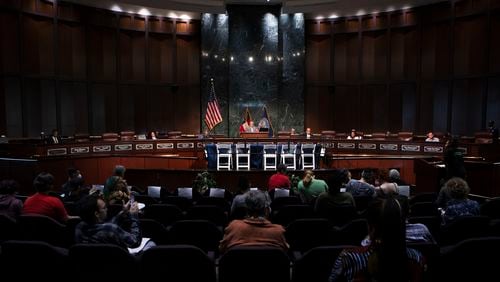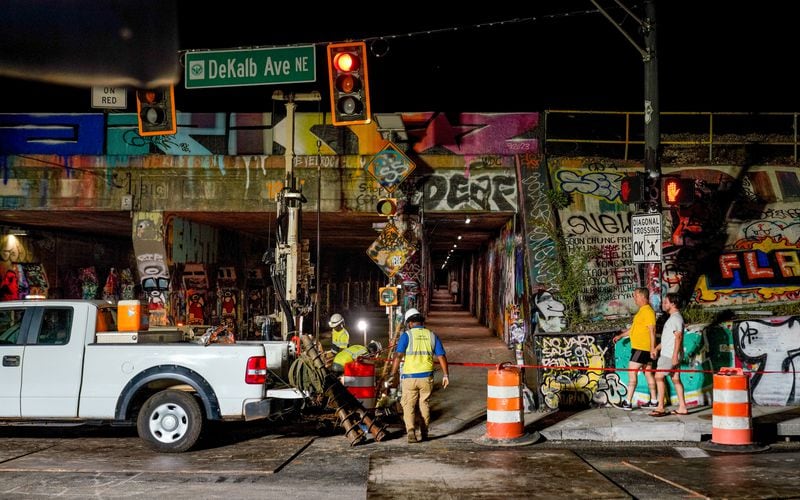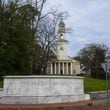Editor’s Note: This story has been updated with the correct number for metro Atlanta’s estimated population, and with the correct dollar amount the mayor wants the city council to approve for his Youth Ball.
Over the course of the next month, Atlanta City Council members will take part in the annual process of meticulously reviewing the city’s $853 million general fund budget.
The daunting annual task means dozens of meetings with city department leaders, union groups and public discussions about how Atlanta’s elected leaders will dole out public tax dollars.
And there are always more needs than money.
Atlanta’s population has continued to boom, with the estimated metro population now at around 6.3 million people — the 6th largest metro area in the country, recently surpassing Washington, D.C. and Philadelphia. That growth also brings more complicated decisions.
“Atlanta’s economy is outpacing the national average and continues to draw employers and create significant job opportunities,” said Atlanta’s Chief Financial Officer Mohamed Balla on Wednesday, during the first budget meeting with council members.
The Fiscal Year 2025 general fund budget being proposed by the mayor’s office is up $63 million from the current budget, making it the largest in the city’s history, according to the mayor’s office. Atlanta Mayor Andre Dickens has already outlined his spending priorities for council’s consideration.
In a letter sent on Wednesday, Dickens said the city’s total projected revenue for the new fiscal year starting July 1 reaches about $2.75 billion. He requested that council members OK more than $24 million in new spending on programs to help scout and retain employees as well as more than $29 million more to boost public safety.
“This budget reflects our shared vision of Atlanta as a City of Opportunity for All,” Dickens said in a statement. “As Atlanta’s influence expands on the global stage, it’s imperative that we prioritize critical investments in our infrastructure, residents, and employees.”
The increased public safety budget would buy new radios for police and fire vehicles along with other equipment for $19.4 million; add to the city’s police’s body-camera maintenance and video storage capabilities for $5.3 million; and improve maintenance of the citywide surveillance camera system for $2.1 million.
The proposed FY25 budget also includes a massive $30 million toward capital improvements to build two new fire stations, modernize Atlanta’s municipal buildings and “address years of deferred maintenance.”
The city’s fire department has consistently struggled with out-of-date facilities and rundown trucks which have impacted the department’s ability to respond to fires and emergency medical calls.
Credit: Olivia Bowdoin
Credit: Olivia Bowdoin
Atlanta City Council is also looking to “continue aggressive funding” for vehicle replacements and repairs for the police and fire departments, as well as implement a previously passed pay incentive plan for police in the motorcycle unit.
For personnel increases, the mayor is earmarking $9.5 million to implement the city’s class and compensation study findings and $8.2 million to hire additional staff and fill vacancies.
As an extension of Dickens’ Year of the Youth initiatives, the mayor wants council to approve $1.8 million for At-Promise Youth Centers, $2 million for summer programming and $250,000 for the Mayor’s Youth Ball.
The first-term mayor also wants a $17 million commitment — about 2% of the total budget — to the Affordable Housing Trust Fund. That includes money toward the city’s new Housing Help Center and the 2 Peachtree building that’s destined to be converted from office space to housing units.
Dickens received criticism in the past from housing advocates for short-changing the city’s housing trust fund, or not budgeting dollars toward it at all.
“Increased mortgage rates in home prices are challenging affordability,” Balla told council members Wednesday.
Council member Matt Westmoreland, who serves in one of the citywide seats, said the city has dedicated nearly $36 million to the housing fund since its inception in 2021. The money has gone toward initiatives from eviction prevention programs to affordable housing production.
“It is a way to have a reoccurring, local stream of money to help with production — especially for units at 50% of the (area median income) and below,” he said. “It’s very meaningful to have seen it fully-funded in all three years.”
Atlanta City Council members have offered their own set of priorities for housing and other initiatives — particularly programs geared toward Atlanta’s legacy residents.
Members want to invest additional dollars toward the city’s Legacy Resident Housing Stabilization Fund, Senior Citizen Housing Code Relief Fund and launch the first program to support legacy business owners.
For capital improvements, council wants to increase funds to help reduce the backlog of street repaving projects — also included in the mayor’s priorities — and triple the Atlanta Department of Transportation’s budget to help reduce traffic in congested areas to about $3 million.
City Council President Doug Shipman said that as the population continues to grow, Atlanta’s elected leaders are putting a heavy focus on whether the city is able to keep up with the delivery of basic services.
“We’re seeing an increase in the economy in Atlanta,” he said. “More growth in housing, building and overall business licenses are up — so I think there will be continued questions around are we prepared for this?”
More people means greater demand for things like business licenses, permits and inspections. It also means speeding up deliver of watershed and transportation projects to prop up the city’s infrastructure.
Credit: Ben Hendren
Credit: Ben Hendren
Following a series of pedestrian safety measures, council is also looking to allocate additional funds toward bike lane connectivity throughout neighborhoods.
The mayor also wants to continue his focus on youth programs as part of a larger effort to combat crime and keep Atlanta’s young residents off the streets in their free time.
Final budget decisions are set to be approved at the full council meeting on June 3.
Key budget presentations dates:
May 2: Department of Corrections, 11 a.m.; Fire Department, 1 p.m.
May 7: Atlanta Police Department, 9:30 a.m.; Department of Watershed Management, 11 a.m.; Department of Parks and Recreation, 2 p.m.
May 9: Atlanta Department of Transportation, 9:30 a.m.; Department of Aviation, 1 p.m.
May 22: Executive Offices, 10:30 a.m.;
May 29: Public hearings on tax mileage rate, 12 p.m. and 6 p.m.
You can see the full budget briefing schedule at https://citycouncil.atlantaga.gov/Home/Components/News/News/3803/175?backlist=%2fhome
About the Author









